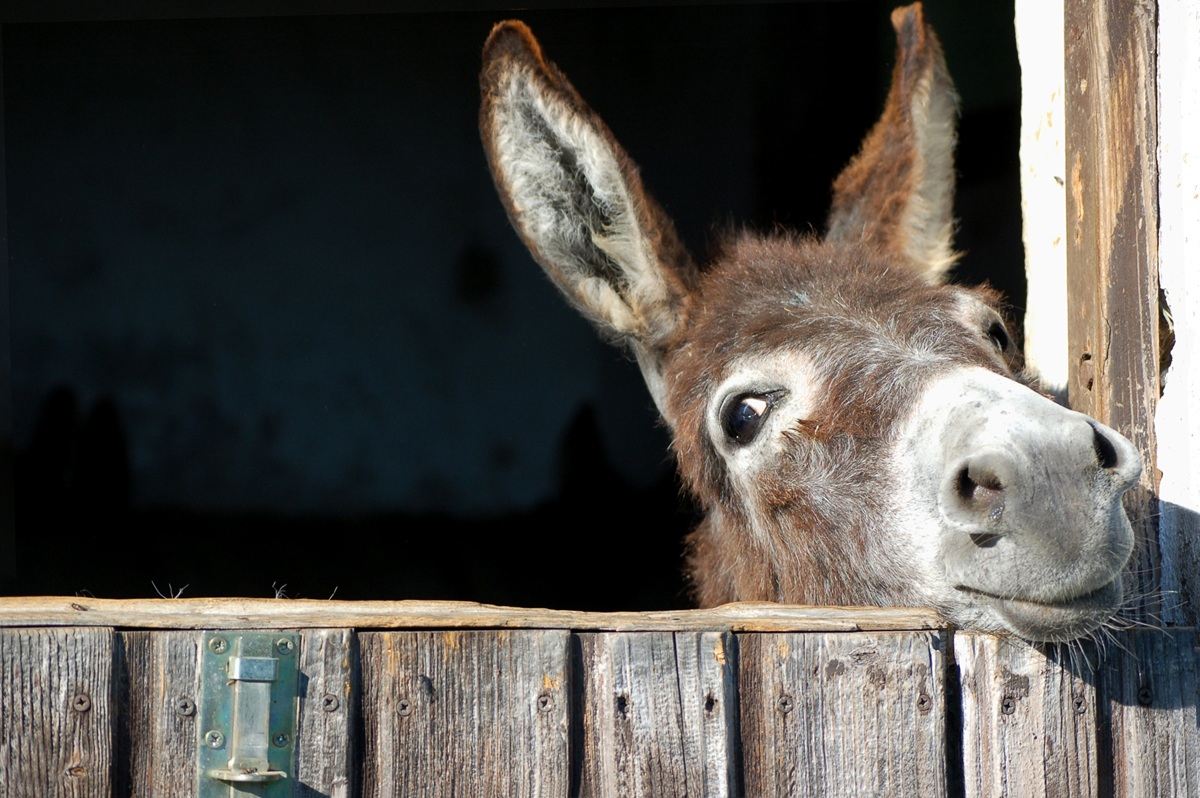Animal Chatter
By Iris Winston
Donkeys are often misunderstood.

Sandra Pady, founder of the Donkey Sanctuary of Canada (DSC), often said that this was why some 200 acres of her rural property have been a designated refuge for unwanted, neglected or abused donkeys, mules and hinnies since 1992.
Mules are the offspring of a male donkey and a female horse. Hinnies are fathered by horses with donkeys as their mothers. The vast majority of both mules and hinnies are sterile and the relative sizes of horses and donkeys mean that far fewer hinnies than mules are born.
While all three are equines, they are not exactly like horses. As noted on the DSC website, “donkeys are not horses with long ears.” They are a separate species, with different nutritional and care needs, different temperaments and a longer life expectancy.
 Horses generally live between 25 and 30 years, though the numbers vary a little among breeds. Donkeys live considerably longer. It is not unusual for a donkey to live for 40 or even 50 years. At this time, the oldest donkey at the DSC is 39-year-old Da Vinci, born in 1986, and a tranquil and gentle resident at the sanctuary since 2011.
Horses generally live between 25 and 30 years, though the numbers vary a little among breeds. Donkeys live considerably longer. It is not unusual for a donkey to live for 40 or even 50 years. At this time, the oldest donkey at the DSC is 39-year-old Da Vinci, born in 1986, and a tranquil and gentle resident at the sanctuary since 2011.
The difference in life expectancy between horses and donkeys is often the main reason that the original owner is unable to keep an aging donkey. As older humans choose to downsize or experience major health issues, they are no longer in a position to give the senior donkeys the care they need and deserve.
“It’s not unusual for us to get donkeys here that have been cared for and loved for many years,” says Dale Gellatly, the fund development and communication lead at the sanctuary. “Then lives change. Owners have to sell their farms and can no longer care for their animals.”
Another misconception that leads to owners giving up their donkeys is that all donkeys are guardian animals.
“There is a perception that they can protect herds of sheep or cattle,” says Dale. “Some donkeys might be guardian animals, but they have to care. Some do. Others don’t. Then some people don’t want them any more. And there is no way to tell in advance which donkeys will function as guardians.”
 Donkeys, originally found in the deserts of North Africa, need less water and food than horses. They are also steady on rough terrain, partly because their elongated hooves are different from the more rounded hooves of horses. The differences between the species lead to donkeys being used as pack animals in areas where food and water are relatively scarce. They need plenty of plant fibre and little sugar in their diets as they are prone to weight gain. While they enjoy the sweetness of grass, their access to pastures must be carefully monitored.
Donkeys, originally found in the deserts of North Africa, need less water and food than horses. They are also steady on rough terrain, partly because their elongated hooves are different from the more rounded hooves of horses. The differences between the species lead to donkeys being used as pack animals in areas where food and water are relatively scarce. They need plenty of plant fibre and little sugar in their diets as they are prone to weight gain. While they enjoy the sweetness of grass, their access to pastures must be carefully monitored.
Even more important than watching donkey diets and ensuring regular hoof and medical care is keeping them happy. Donkeys are social animals who bond with other donkeys or, on occasion, with another animal or human.
“Donkeys are herd animals who generally prefer to bond with one of their own kind,” says Dale. “We would never split a bonded pair or put a donkey out alone.”
The DSC continues to fulfill its mission “to provide a lifelong home to donkeys, mules and hinnies who are unwanted, neglected or abused, or whose owners can no longer care for them, and to promote the responsible stewardship of all animals through humane education.”
The excellent care the sanctuary offers has resulted in universal recognition. Accredited by the Global Federation of Animal Sanctuaries in 2017, it went on to win the international organization’s Outstanding Sanctuary Award in 2023. Such recognition indicates the high standard of care observed by the Donkey Sanctuary of Canada.
Currently, 82 donkeys, 13 mules and two hinnies, plus three barn cats, are living at the DSC, with more animals expected shortly. In addition, another 82 donkeys are being cared for on 42 host farms nearby.
“Having the carefully selected and monitored host farms creates some space here (at the sanctuary),” says Dale. “We’re at capacity with a very small staff and a lot of volunteers that we couldn’t manage without.”
For more information about the Donkey Sanctuary of Canada or to meet some of the residents on an upcoming open day, visit www.thedonkeysanctuary.ca.
Almonte, Ontario, writer Iris Winston is a former executive director of the Canadian Federation of Humane Societies. She has been an animal lover all her life. Her pets have always been important members of her family.






